Book1Unit2EnglisharoundtheworldReading-湖北省通山县第一中学高中英语必修一导学案
- 格式:doc
- 大小:209.00 KB
- 文档页数:2
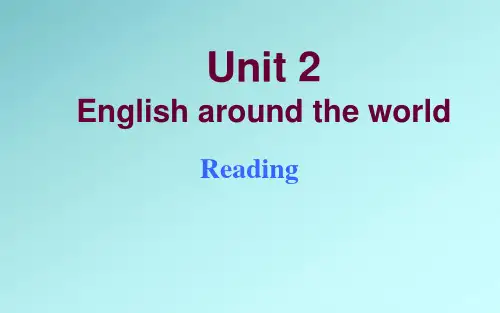


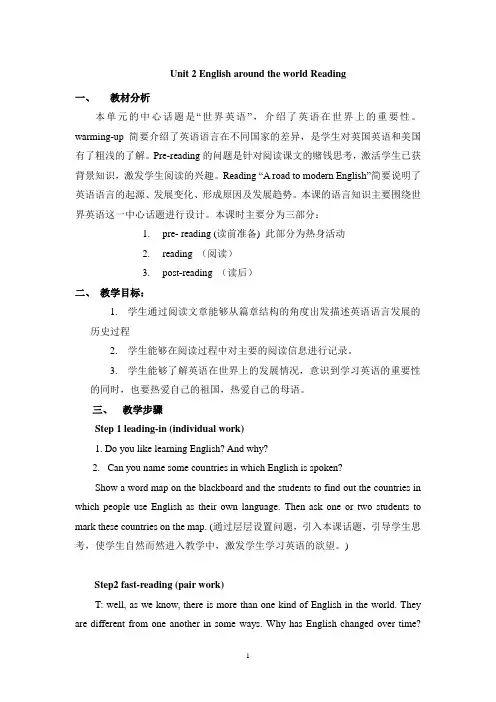
Unit 2 English around the world Reading一、教材分析本单元的中心话题是“世界英语”,介绍了英语在世界上的重要性。
warming-up 简要介绍了英语语言在不同国家的差异,是学生对英国英语和美国有了粗浅的了解。
Pre-reading的问题是针对阅读课文的赌钱思考,激活学生已获背景知识,激发学生阅读的兴趣。
Reading “A road to modern English”简要说明了英语语言的起源、发展变化、形成原因及发展趋势。
本课的语言知识主要围绕世界英语这一中心话题进行设计。
本课时主要分为三部分:1.pre- reading (读前准备) 此部分为热身活动2.reading (阅读)3.post-reading (读后)二、教学目标:1.学生通过阅读文章能够从篇章结构的角度出发描述英语语言发展的历史过程2.学生能够在阅读过程中对主要的阅读信息进行记录。
3.学生能够了解英语在世界上的发展情况,意识到学习英语的重要性的同时,也要热爱自己的祖国,热爱自己的母语。
三、教学步骤Step 1 leading-in (individual work)1. Do you like learning English? And why?2.Can you name some countries in which English is spoken?Show a word map on the blackboard and the students to find out the countries in which people use English as their own language. Then ask one or two students to mark these countries on the map. (通过层层设置问题,引入本课话题,引导学生思考,使学生自然而然进入教学中,激发学生学习英语的欲望。
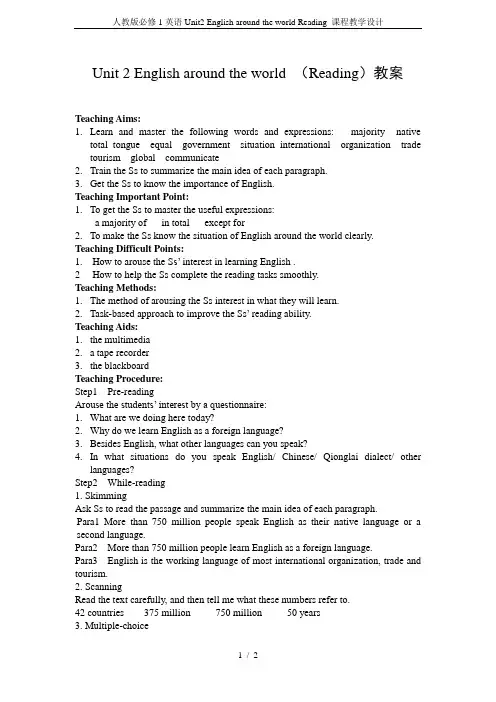
Unit 2 English around the world (Reading)教案Teaching Aims:1.Learn and master the following words and expressions: majority nativetotal tongue equal government situation international organization trade tourism global communicate2.Train the Ss to summarize the main idea of each paragraph.3.Get the Ss to know the importance of English.Teaching Important Point:1.To get the Ss to master the useful expressions:a majority of in total except for2.To make the Ss know the situation of English around the world clearly. Teaching Difficult Points:1. How to arouse the S s’ interest in learning English .2 How to help the Ss complete the reading tasks smoothly.Teaching Methods:1.The method of arousing the Ss interest in what they will learn.2.Task-based approach to improve the Ss’ reading ability.Teaching Aids:1.the multimedia2. a tape recorder3.the blackboardTeaching Procedure:Step1 Pre-readingArouse the students’ interest by a questionnaire:1.What are we doing here today?2.Why do we learn English as a foreign language?3.Besides English, what other languages can you speak?4.In what situations do you speak English/ Chinese/ Qionglai dialect/ otherlanguages?Step2 While-reading1. SkimmingAsk Ss to read the passage and summarize the main idea of each paragraph.Para1 More than 750 million people speak English as their native language or a second language.Para2 More than 750 million people learn English as a foreign language.Para3 English is the working language of most international organization, trade and tourism.2. ScanningRead the text carefully, and then tell me what these numbers refer to.42 countries 375 million 750 million 50 years3. Multiple-choice1. People from the following countries except ____ use English as their mother language.A. New ZealandB. South AfricaC. the PhilippinesD. Ireland2. Which is true about those who use English as a second language?A.English is also their mother tongue.B.English is usually the official language in their countries.C.They learn English for five or six years at high school.D.They talk with family members at home in English.3. What’s the situation of English used in China?A. All Chinese students speak English as a foreign language.B. Most Chinese students learn English at school as a foreign language.C. The majority of Chinese speak English at school as a foreign language.D. The majority of people in Hong Kong use English as their mother tongue.4. Which of the following statements cannot be inferred from the last paragraph?A. In the past 50 years, the English language has developed very fast.B. English is widely used in different fields around the world.C. Those who can’t speak good English will never be successful in international trade.D. More and more people around the world will be able to communicate in English.Step 3. Post -reading1. Complete the summary on P11.2. Listen to the text and repeat after the tape.3. RetellingAsk the students to retell the text in their own words with their books closed.The teacher will show some key words on the screen to help them.Then invite some students to retell the three paragraphs in turn.Step 5 HomeworkTry to retell the text in your own words and write down the passage.。
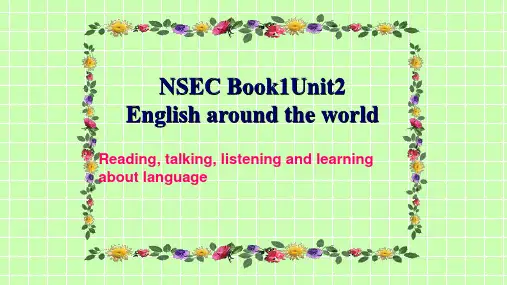
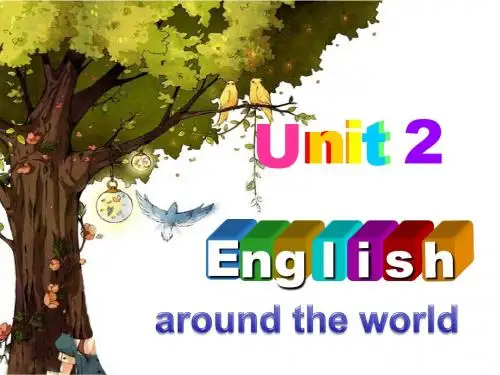
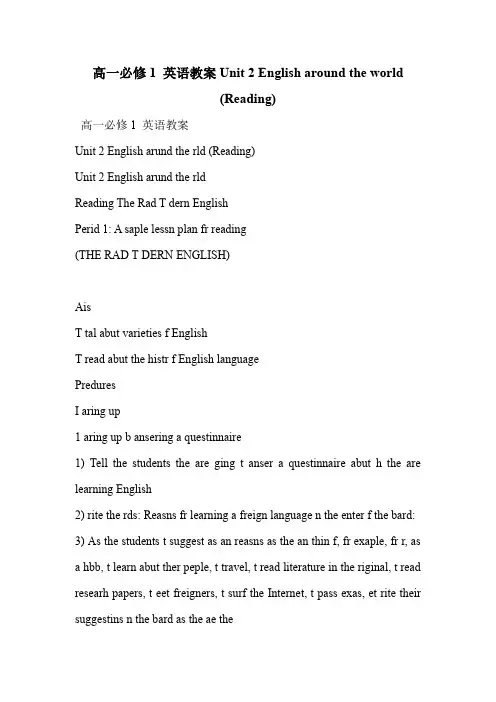
高一必修1 英语教案Unit 2 English around the world(Reading)高一必修1 英语教案Unit 2 English arund the rld (Reading)Unit 2 English arund the rldReading The Rad T dern EnglishPerid 1: A saple lessn plan fr reading(THE RAD T DERN ENGLISH)AisT tal abut varieties f EnglishT read abut the histr f English languagePreduresI aring up1 aring up b ansering a questinnaire1) Tell the students the are ging t anser a questinnaire abut h the are learning English2) rite the rds: Reasns fr learning a freign language n the enter f the bard:3) As the students t suggest as an reasns as the an thin f, fr exaple, fr r, asa hbb, t learn abut ther peple, t travel, t read literature in the riginal, t read researh papers, t eet freigners, t surf the Internet, t pass exas, et rite their suggestins n the bard as the ae the4) Divide the lass int pairs) Give ut eah student ne questinnaire paper6) Explain the tas The students ust questin eah ther abut their language learning needs (r tivatins) Tell the that u are ging t tae in the questinnaires at the end, and that u’d lie the t ae lear ntes It rs better if the t partners sap tass (questins and ansers) after eah setin f the questinnaire If the ait till the end t sap, ne student a use up all the tie available7) hen the tas is finished, as a uple f students t suarize their partners’ansers (This a develp int a lass disussin abut language needs)8) The students rite five sentenes n their feeling abut learning English9) llet the questinnairesNeeds Analsis QuestinnaireIntervieer_______________Intervieee_______________Present use: situatins and sillsReading (faxes, letters ≈ reprts)Listening ≈ speaing (telephning, eetings, negtiatins, publi speaing, sializing)riting (faxes, letters ≈ reprts)Future use: expetatins ≈ abitins2 Further applingT get the students thining abut the tpi f the reading passage1) Have a student list n the bard all the English-speaing untries in the rld that the an thin f2) Give the students hints abut the plaes the haven’t entined3) Prvide the students ith an pprtunit t thin abut the reasns fr the spread f English arund the rld★English is ne f the ffiial languages f the lpi Gaes and the United Natins★English dinates internatinal ebsites and prvides nearl all f the ne puter terinlg★Turis and trade fr estern Eurpe and Nrth Aeria has ntributed t the spread f English★Satellite TV, radi prgras lie F, Ds and, f urse, Hlld fils all bradast English int hina Als, a nuber f hinese fils inlude English subtitlesII Reading1 SiingRead quil t get the ain idea f the textLet the students find ut e sentene f eah paragraph r as the t suarize the ain pint fr eah paragraph in their n rdsParagraph 1: The spread f the English language in the rldParagraph 2: Native speaer an understand eah ther but the a nt be able t understand everthingParagraph 3: All languages hange hen ultures uniate ith ne antherParagraph 4: English is spen as a freign language r send language in Afria and Asia2 SanningRead t late partiular infratin and plete the prehending Exerise ne3 Flling upr in grups Disuss the t questins and then as t grups t reprt their ansers t the lass1) D u thin it atters hat ind f English u learn? h?Pssible anser:I dn’t thin s Here are the reasns:★Native speaers fr different parts f the rld have n diffiult in understanding eah ther despite the fat that the spea a bit differentl★It is neessar fr us t learn the narr differene beteen different inds f English if e hpe t uniate fluentl ith native speaers f English fr all ver the rld★Different inds f English have the sae language re If u have gt a gd and f ne ind, u ill alst have n diffiult understanding anther ind f English(An persuasive and supprting reasn the students give an be aepted)1) h d u thin peple all ver the rld ant t learn English?Pssible anser:The reasns h peple all ver the rld ant t learn English:★ith en glbalizatin, English has bee the best bridge t serve the purpse fpeple all ver the rld uniating ith ne anther★Hever, lie all ar languages in the rld, English is alas hanging In rder t adust t native speaers fr different parts f the rld, it is a ust fr peple all ver the rld t learn English, hether in English speaing untries r in nn-English speaing untries★Als, peple fr different parts f the rld spea English ith varius aent and dialets, and peple have t learn abut the differene beteen different inds f English in rder t avid isunderstanding hile uniating(All persuasive reasns an be aepted)4 Language fus:1) even if=even thugh: in spite f the fat; n atter hether: He lies t help us even if he is ver bus2) uniate ith: exhange infratin r nversatin ith ther peple: He learnt t use bd language t uniate ith deaf usters3) atuall=in fat: used hen u are adding ne infratin t hat u have ust said: e’ve nn fr ears Atuall, sine e ere babies4) be based n…:) ae use f: use sth available6) nl tie ill tell: t sa that sething an nl be nn in the future: ill hina’s natinal ftball tea enter fr the next finals f the rld up? nl tie ill tellLanguage huns fr Unit 2 English arund the rldbe different fr, pa a rle(part) in, beause f, either …r…, in/n a tea, thenuber f/a nuber f, than ever befre, even if, p up t, ver tie, uniate ith, be based n, ae use f, have ne’s n identit, suh as, nl tie an tell, native speaer, as ell as, slve a prble, believe it r nt, n suh a…, all ver the rld, at the tp(btt) f, pen friends, t this da, su up, Pardn?, beg ur pardn, g abrad, be used fr, re f a …, enurage sb t d sth, r n, feel lie sth,fr tie t tie, English-speaing untries, fr ne…t anther, d business, n the air, uld lie sb t d, ae ntes, fight against, eep…a seret, even thugh, save tie(ne), a fr f…Perid 2: A saple lessn plan fr Learning abut Language(Indiret Speeh (II) requests ≈ ands)AisT disver useful rds and expressinsT disver useful struturesPreduresI Diret and Indiret SpeehDiret Speeh Indiret Speehsiple presentHe said, “I g t shl ever da” siple pastHe said (that) he ent t shl ever dasiple pastHe said, “I ent t shl ever da” past perfetHe said (that) he had gne t shl ever dapresent perfetHe said, “I have gne t shl ever da” past perfetHe said (that) he had gne t shl ever dapresent prgressiveHe said, “I a ging t shl ever da” past prgressive He said (that) he as ging t shl ever dapast prgressiveHe said, “I as ging t shl ever da” perfet prgressive He said (that) he had been ging t shl ever da, future (ill)He said, “I ill g t shl ever da” uld + verb naeHe said (that) he uld g t shl ever dafuture (ging t)He said, “I a ging t shl ever da” present prgressive He said (that) he is ging t shl ever dapast prgressiveHe said (that) he as ging t shl ever daDiret Speeh Indiret Speehauxiliar + verb naeHe said, “D u g t shl ever da?”He said, “here d u g t shl?” siple pastHe ased e here I ent t shliperativeHe said, “G t shl ever da” infinitiveHe said t g t shl ever daDiret Speeh Indiret Speehsiple present + siple presentHe sas, “I g t shl ever da” siple present + siple presentHe sas (that) he ges t shl ever dapresent perfet + siple presentHe has said, “I g t shl ever da” present perfet + siple present He has said (that) he ges t shl ever dapast prgressive + siple pastHe as saing, “I ent t shl ever da” past prgressive + siple past He as saing (that) he ent t shl ever dapast prgressive + past perfetHe as saing (that) he had gne t shl ever daDiret Speeh Indiret SpeehanHe said, “I an g t shl ever da” uldHe said (that) he uld g t shl ever daaHe said (that) he ight g t shl ever daightHe said, “I ight g t shl ever da”ustHe said, “I ust g t shl ever da” had tHe said (that) he had t g t shl ever dahave tHe said, “I have t g t shl ever da”shuldHe said, “I shuld g t shl ever da” shuldHe said (that) he shuld g t shl ever daught tHe said, “I ught t g t shl ever da” ught tHe said (that) he ught t g t shl ever daII Disvering useful rds and expressins1 r in pairs D exerises 1, 2, 3 and 4 Then he the anser u’re ur lassates The teaher helps the students disver the differene in prepsitins2 Pla the tape fr the students t listen and as the t ar the sentene stress and intnatin Then pratie reading in pairs(The teaher brings the students’attentin t the British and Aerian rds that are different but have the sae eaning)III Disvering useful strutures(aing ands and requests using indiret speeh)1 In grups f fur, thin f at least three ands ur teahers and parents usuall give u a fll these steps1) hse ne h is t give the first and2) As anther persn in ur grup t tell seb。
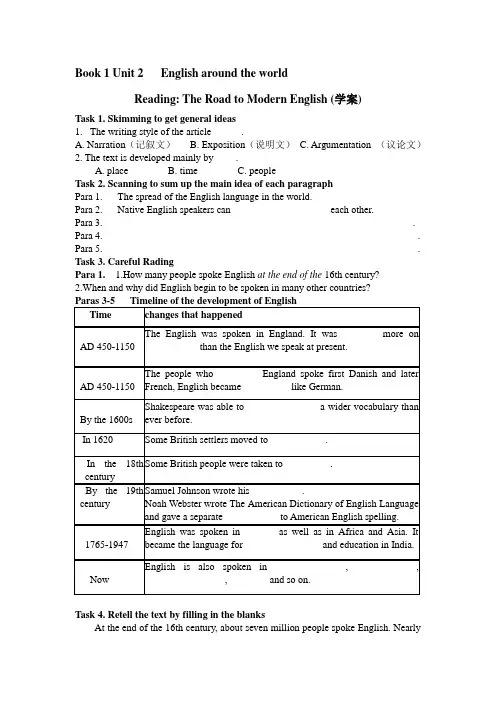
Book 1 Unit 2 English around the worldReading: The Road to Modern English (学案)Task 1. Skimming to get general ideas1. The writing style of the article______.A. Narration (记叙文)B. Exposition (说明文)C. Argumentation (议论文)2. The text is developed mainly by ____.A. placeB. timeC. peopleTask 2. Scanning to sum up the main idea of each paragraphPara 1. The spread of the English language in the world.Para 2. Native English speakers can ___________________ each other.Para 3. ___________________________________________________________. Para 4. ____________________________________________________________. Para 5. ____________________________________________________________. Task 3. Careful RadingPara 1. 1.How many people spoke English at the end of the 16th century?2.When and why did English begin to be spoken in many other countries? Paras 3-5 Timeline of the development of EnglishTime changes that happenedAD 450-1150The English was spoken in England. It was ________more on ___________than the English we speak at present.AD 450-1150 The people who ________ England spoke first Danish and later French, English became _________ like German. By the 1600s Shakespeare was able to ______________ a wider vocabulary than ever before.In 1620Some British settlers moved to ___________. In the 18th centurySome British people were taken to _________.By the 19th century Samuel Johnson wrote his __________.Noah Webster wrote The American Dictionary of English Language and gave a separate ___________to American English spelling. 1765-1947 English was spoken in ______ as well as in Africa and Asia. It became the language for _______________ and education in India.Now English is also spoken in ______________, ____________, ________________, ________and so on.Task 4. Retell the text by filling in the blanksAt the end of the 16th century, about seven million people spoke English. Nearlyall of them lived in ________. As people from England started ______ to other parts of the world, English began to be ______ in many other countries. Now more people speak English than ever_______. ________English speakers can understand each other even ___they don’t speak _____same kind of English . _______, they may not be able to understand everything.All languages change when ________ communicate with each other. Now American English and Australian English have their own_______.English is also spoken in many other countries in Africa and______, such____ South Africa, Indian, Singapore and Malaysia. Today the number of the people in China ___ increasing _______.Book 1 Unit 2 English around the WorldWord Study (学案)ter in the next century, people from England made voyages to conquer otherparts of the world and because of that, English began to be spoken in many other countries. (P10)because of 【观察与思考】①He was late because of the traffic jam.=_______________ he was caught in the traffic jam, he was late.②We stayed at home because it rained heavily.= We stayed at home ____________________ the heavy rain.③He was punished just because of what he had said.= He was punished just _____________ he had said something wrong.①because of “因为;由于”,是___ 短语,其后可接___ ,__ 动名词或由what引导的从句。
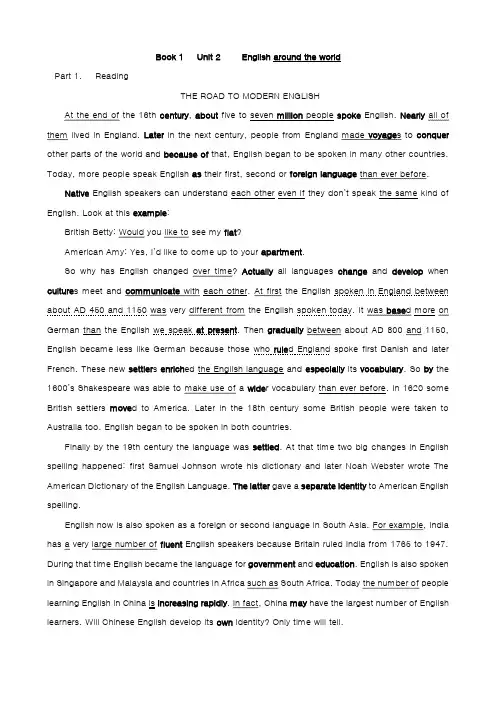
Book 1 Unit 2 English around the worldPart 1. ReadingTHE ROAD TO MODERN ENGLISHAt the end of the 16th century, about five to seven million people spoke English. Nearly all of them lived in England. Later in the next century, people from England made voyage s to conquer other parts of the world and because of that, English began to be spoken in many other countries. Today, more people speak English as their first, second or foreign language than ever before.Native English speakers can understand each other even if they don’t speak the same kind of English. Look at this example:British Betty: Would you like to see my flat?American Amy: Yes, I’d like to come up to your apartment.So why has English changed over time? Actually all languages change and develop when culture s meet and communicate with each other. At first the English spoken in England between about AD 450 and 1150 was very different from the English spoken today. It was base d more on German than the English we speak at present. Then gradually between about AD 800 and 1150, English became less like German because those who rule d England spoke first Danish and later French. These new settler s enrich ed the English language and especially its vocabulary. So by the 1600’s Shakespea re was able to make use of a wide r vocabulary than ever before. In 1620 some British settlers move d to America. Later in the 18th century some British people were taken to Australia too. English began to be spoken in both countries.Finally by the 19th century the language was settled. At that time two big changes in English spelling happened: first Samuel Johnson wrote his dictionary and later Noah Webster wrote The American Dictionary of the English Language. The latter gave a separate identity to American English spelling.English now is also spoken as a foreign or second language in South Asia. For example, India has a very large number of fluent English speakers because Britain ruled India from 1765 to 1947. During that time English became the language for government and education. English is also spoken in Singapore and Malaysia and countries in Africa such as South Africa. Today the number of people learning English in China is increasing rapidly. In fact, China may have the largest number of English learners. Will Chinese English develop its own identity? Only time will tell.Part 2. Using LanguageSTANDARD ENGLISH AND DIALECTSWhat is standard English? Is it spoken in Britain, the US, Canada, Australia, India and New Zealand? Believe it or not, there is no such thing as standard English. Many people believe the English spoken on TV and the radio is standard English. This is because in the early days of radio, those who report ed the news were expect ed to speak excellent English. However, on TV and the radio you will hear differences in the way people speak.When people use word s and expression s different fro m “standard language”, it is called a dialect. American English has many dialects, especially the midwestern, southern, African American and Spanish dialects. Even in some parts of the USA, two people from neighbour ing towns speak a little differently. American English has so many dialects because people have come from all over the world.Geography also plays a part in making dialects. Some people who live in the mountains of the eastern USA speak with an older kind of English dialect. When Americans moved from one place to another, they took their dialects with them. So people from the mountains in the southeastern USA speak with almost the same dialect as people in the northwestern USA. The USA is a large country in which many different dialects are spoken. Although many Americans move a lot, they still recognize and understand each other’s dialects.Part 3. Reading and speakingAmy and her American friends are visiting London. They plan to visit Amy’s aunt and decide to go there by underground, but cannot find the nearest underground station. So she asks direction s and then tells her friends. Read the dialogue and circle the words that mean the same.AMY: Excuse me, Ma’ma. Could you tell me where the nearest subways is?LADY: Er...the underground? Well, go round the corner on your left-hand side, straight on and cross two streets. It’ll be on your right-hand side.AMY: Thanks so much.FRIENDS: What did she say, Amy?AMY: She told us to go around the corner on the left and keep going straight for two block s. The subway will be on our right.。
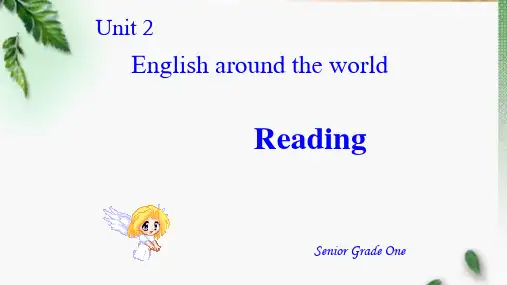
Book 1 Unit2 English around the world Reading【Learning goals】1.To consoliadate the new vocabulary.2.Get to know the development of modern English.3.Be able to use different reading strategies to finish different reading tasks.【使用说明】1.阅读课本P9课文The Road To Modern English独立完成导学案。
⑴读文章标题,完成预习探究task1。
(2)略读课文1遍,把握段落主旨大意,完成预习探究task2。
⑶跳读课文1 遍,快速查找信息,完成预习探究task3。
(4)细读课文1遍,完成课内探究task4-5。
(5)结合课后注释和课本翻译,找出并理解课文中重难点词组和句子。
完成当堂检测tas k 6-8。
2. 仍未解决的问题填写在学贵有疑中,留待课堂质疑解决。
【预习探究】Task 1: PredictionRead the title “The Road to Modern English” and predict what the passage mainlytalks about.______________________________________________________________________________________________________________________________________Task 2: Skim the text to find a key sentence or summarize the main idea for eachparagraph.Para1. _______________________________________________________________Para2. _______________________________________________________________Para3. _______________________________________________________________Para4. _______________________________________________________________Para5. _______________________________________________________________Task 3. Scan the text to fill in the form below.Timeline Development[来源:]At the end ofthe 16thcenturyAbout 5 to 7 million people spoke English.___________ English began to be spoken in many other countries.【方法指导】跳读课文,培养快速寻找有效信息的能力。
【随堂笔记】【方法指导】有效的AD450--115English was based more on ________ .AD800--1150 _________ and ___________ settlers enriched theEnglish language and especially its vocabulary.By the 1600’s_________ could make use of a wider vocabulary thanever before.In 1620 English began to be spoken in __________.Later in the18th centuryEnglish began to be spoken in ___________.By the 19thcenturyEnglish was ___________.Now English is also spoken as a foreign or second language in____________ and __________.【课内探究】Task 4: Discussion1.Why do you think people all over the world are learning English?2.Why do you think more people in the world want to learn Chinese?Task 5: SummaryAt 1 end of 16th century, English was only spoken by people from England.They were native speakers. Today, the largest number of people 2 (speak)English may be in China. A lot of Chinese people speak English 3 their foreignlanguage.The Englsih language 4 (change) quite a lot over the past four centuries. OldEnglish sounded more or less like German because it 5 (base) on German, butmodern English sounds 6 (much) like French than German because Englandwas once ruled by the French.Two people had great effects on th e English changes. 7 was Shakespeare,who 8 (rich) the Englsih vocabulary; the other was Noah Webster, 9 wrote adictionary which gave Amercan English 10 (it) own identity.1._____________2.___________3.____________4.____________5.______________6._____________7.____________8._____________9.______________ 10.____________【当堂检测】进行整理阅读才能把握文章主题。
【方法指导】细读课文,构建文章的整体框架,培养捕捉细节能力。
[来源:]【随堂笔记】[来源学*科*网Z*X*X*K]Task6:用所给单词的正确形式填空。
[来源学科网]1.________ (actual), I am very nervous because it is my first time to give a speech in English.2.A s the weather ___________ (gradual) becomes warmer and warmer, he will recover soon.3.I have a dream that one day I can speak English __________ (fluent) and write beautiful articles.4.T he mother looks at the door __________ (frequent), expecting the children’s coming.5.S he received several ________ (office) letters this morning.6.T he population of that country is increasing _________ (rapid).7.B efore his retirement from the navy, he was a __________ (command).8. The police can’t _________ (identity) the dead man in the traffic accident. Task7: 选词填空(可变换形式)1.Turn right and you will see the bookshop _____________ the street. [来源学科网ZXXK]2. A foreigner ___________ to the counter(柜台) and asked if he could be givensome postcards.3._____________ his carelessness, he didn’t pass the exam.4.He has been to many countries, __________ Canada, Great Britain and Japan.5.The film which ____________ a true stor y touched so many people.6.Humans have to _____________ the limited natural resources.7.__________ he knows the secret, he will not give it away.8.I quite agree with you; _________ you took the words out of my mouth.9.There are now more women in this field _________________.10.______________ foreign students attending Chinese universities has been rising. [来源学。
科。
网]11.Of the two, ____________ is better than the former(前者).12.__________ one girl in my class is fond of dancing.13.__________ I do not have information on the meeting you asked about.14._______________housewives are carzy about soap opera.15.These two books I bougt last week ____________ each other.Task 8【链接高考】【方法指导】课文复述是语法填空的最佳材料,熟读课文有利于掌握语法填空技巧。